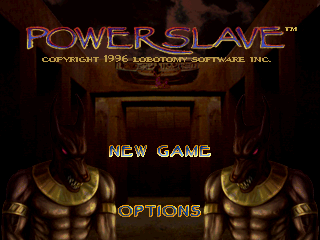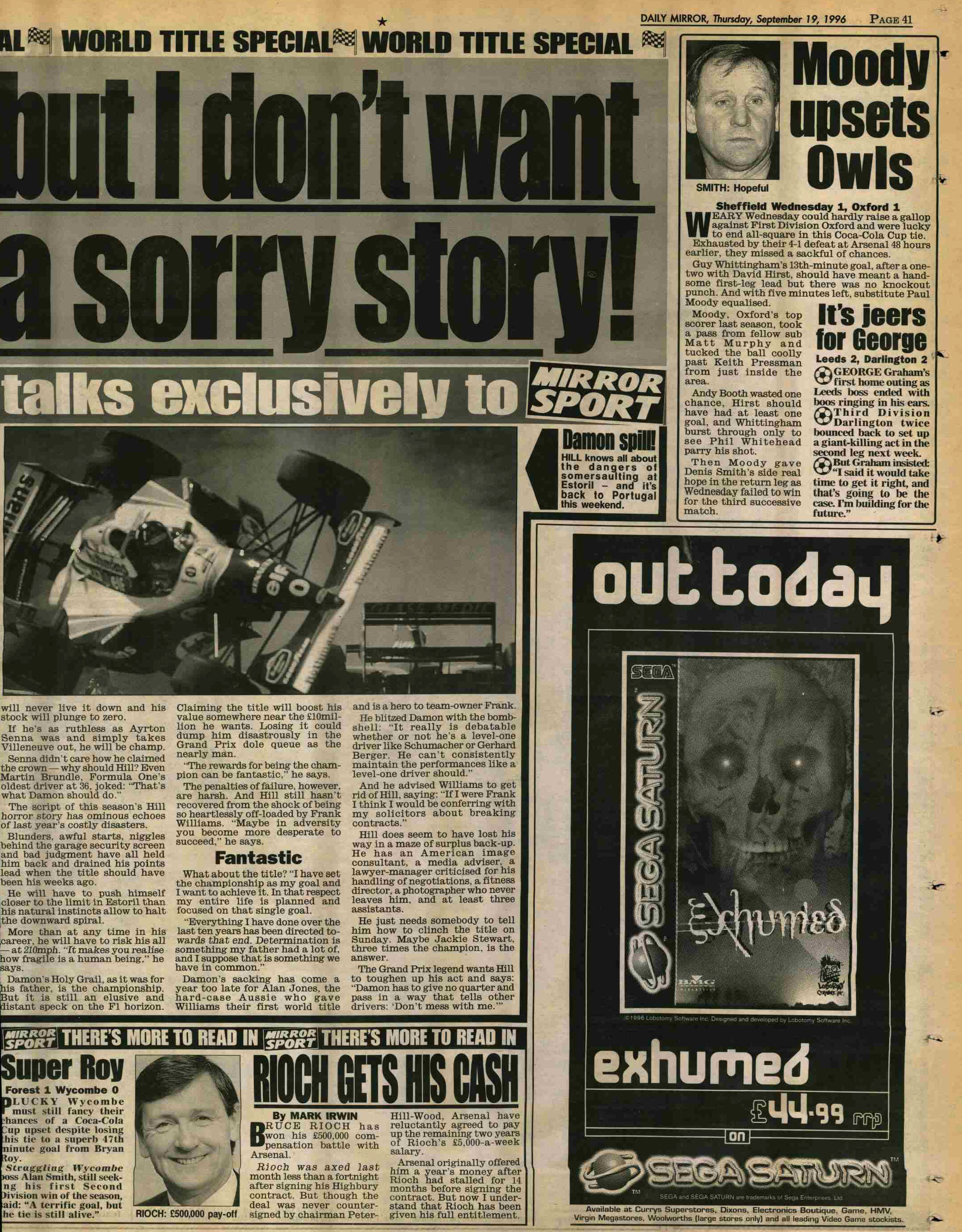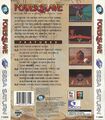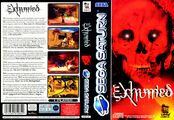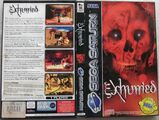Difference between revisions of "Powerslave"
From Sega Retro
| Line 7: | Line 7: | ||
| peripherals=[[Saturn 6 Player Adaptor]] (for Death Tank) | | peripherals=[[Saturn 6 Player Adaptor]] (for Death Tank) | ||
| players=1 (2-6 for Death Tank) | | players=1 (2-6 for Death Tank) | ||
| − | | genre=Action{{ref|https://web.archive.org/web/20200320230509/https://sega.jp/fb/segahard/ss/soft_licensee2.html}} | + | | genre=Action{{fileref|PowerSlave Saturn JP Box Back.jpg}}{{ref|https://web.archive.org/web/20200320230509/https://sega.jp/fb/segahard/ss/soft_licensee2.html}} |
| languages={{LanguageList|en|de|fr|es|jp}} | | languages={{LanguageList|en|de|fr|es|jp}} | ||
| originalsystem=PC | | originalsystem=PC | ||
Revision as of 14:52, 18 October 2020
| Powerslave | ||||||||||||||||||||||||||||||||||||||||
|---|---|---|---|---|---|---|---|---|---|---|---|---|---|---|---|---|---|---|---|---|---|---|---|---|---|---|---|---|---|---|---|---|---|---|---|---|---|---|---|---|
| System(s): Sega Saturn | ||||||||||||||||||||||||||||||||||||||||
| Publisher: BMG Interactive (Japan, Europe), Playmates Interactive Entertainment (US) | ||||||||||||||||||||||||||||||||||||||||
| Developer: Lobotomy Software | ||||||||||||||||||||||||||||||||||||||||
| Original system(s): PC | ||||||||||||||||||||||||||||||||||||||||
| Sound driver: SCSP/CD-DA (13 tracks) | ||||||||||||||||||||||||||||||||||||||||
| Peripherals supported: Saturn 6 Player Adaptor (for Death Tank) | ||||||||||||||||||||||||||||||||||||||||
| Genre: Action[1][2] | ||||||||||||||||||||||||||||||||||||||||
| Number of players: 1 (2-6 for Death Tank) | ||||||||||||||||||||||||||||||||||||||||
| Official in-game languages: | ||||||||||||||||||||||||||||||||||||||||
| ||||||||||||||||||||||||||||||||||||||||
|
Powerslave, known as Exhumed in Europe and Seireki 1999: Pharaoh no Fukkatsu (西暦1999 ファラオの復活) in Japan, is a first person shooter game developed by Lobotomy Software and released for the Sega Saturn in 1996.
During development the game was known simply as Ruins.
Contents
Gameplay
Death Tank
The North American and Japanese versions of Powerslave contain a mini game called Death Tank that can be accessed if you collect all 23 dolls hidden in the game. The mini-game supports up to 6 players, which was increased up to 7 players in it's sequel, Death Tank Zwei, which can be found in Duke Nukem 3D.
History
Slave Driver game engine
The original version appeared on the PC as a Build engine game and featured many mechanics, levels and content that varied differently. This includes linear level design, in-game speech from the main character, and stock lives that once they've run out, the game ends for the player. When the game was brought to the Sega Saturn and PlayStation, the game was rebuilt from the ground up using a proprietary engine called Slave Driver which was able to render more complex levels, including rooms above other rooms, which was not possible on the Build engine. It also went through a major gameplay re-design thanks to the stronger hardware. The PlayStation and Sega Saturn versions put more focus on exploration and allow the player to replay stages. In order to progress, certain permanent power ups (e.g. magic sandals that allow higher jumps) need to be collected. The Slave Driver engine would become a framework for PC to console ports by Lobotomy Software including Duke Nukem 3D and Quake.
Versions
Powerslave was released on the Sega Saturn several months before its PlayStation counterpart, and for its time was a technical showpiece for the system. With better 3D performance, the PlayStation is able to add more visual effects, true transparency (negating the need for the checkerboard "mesh" pattern used for water), and performance improvements in some areas.
While the Saturn version is capped at 30FPS, the PlayStation can reach highs of 60FPS. As was common for 3D games at the time, however, both versions struggle to hold their desired numbers - the Saturn dropping to 20FPS in more hectic scenes, and the PlayStation also dropping to 30 or 20FPS on occasion. The Saturn version, while slower in this regard, is therefore able to output a more consistent frame rate, with its PlayStation counterpart being noticeably more variable as more frames are dropped.
The PlayStation version is also able to offer better lighting effects, however much of its level geometry has been paired back, with smaller, less complicated rooms being used throughout the experience (and some larger rooms being split up). While a new introduction area is added, several areas lose the sense of scale, to the point where some outdoor areas on the Saturn are indoors on the PlayStation.
The auto-aiming feature of the Saturn version of Powerslave is less effective on the PlayStation, making it harder to hit smaller targets. Also missing is any form of analogue control - while Saturn Powerslave supports the 3D Control Pad, neither Dual Analog or DualShock controllers are supported on Sony's machine.
Reportedly the red spiders were changed to blue scorpions to satisfy Sony's desire for PlayStation games to have unique content when ported from other platforms.
On the PC, Powerslave is an entirely different game, and while many assets are shared between the three versions, the PC has unique levels designed for the Build engine (which on the PC is most notable for powering Duke Nukem 3D, as well as Shadow Warrior and Blood). Powerslave uses an earlier version of the engine than Duke 3D, however, so there are no slopes in the game, and is much more linear in design than is console counterparts.
Death Tank is exclusive to the Saturn version of Powerslave.
Localised names
| Language | Localised Name | English Translation |
|---|---|---|
| English | Exhumed | Exhumed |
| English (US) | Powerslave | Powerslave |
| Japanese | 西暦1999 ファラオの復活 | Seireki 1999: Pharaoh no Fukkatsu |
Screenshot
- Main article: Powerslave/Comparisons.
Production credits
Powerslave and Seireki 1999: Pharaoh no Fukkatsu
TODO: there's a paragraph after the credits row of the Japanese version, translate/check if it's relevant
- Executive Producers: Brian McNeely, Paul Lange
- Game Design and Art Direction: Brian McNeely
- Game Programming: Ezra Dreisbach
- BREW World Editing Tool: David Lawson
- Music and Sound Effects: Scott Branston
- Design Team: Brian McNeely, Dominick Meissner, Ezra Dreisbach, Paul Knutzen, Paul Lange, Mark Coates, Jason Wiggin
- Texture and Ambient Object Art: Troy Jacobson, Joe Kresoja
- Creatures and Weaponry: John Van Deusen
- 3D Modeling: Kevin Chung, William Vallieres
- Cinema Scene and Map Art: Richard Nichols, John Van Duesen
- Art Team: Brian McNeely, Troy Jacobson, John Van Duesen, kevin Chung, Paul Knutzen, Richard Nichols, Erik Klokstad, William Vallieres, Joe Kresoja, Jason Wiggin
- Stage Design: Brian McNeely, Dominick Meissner, Paul Knutzen
- Object and Ambient Light Editing Tool: Jeff Blazier
- Peepshow Animation Tool: Paul Schreiber
- Additional Technical Support: Kurt Pfeifer, John Yuill, Paul Hagerud, John Schwab, Pat Schreiber
- Instruction Manual: Tom Kristensen
- Lobotomy Would Like to Thank: Jacqui Lyons, Marjacq Micro, PIE, Tommy Tellarico, Cheryl Hart, SEGA
- Executive Producer: David Luehmann
- Producer: Chris Archer
- Associate Producer: Carlos Rodriguez
- QA Manager: Rich Frey
- Lead Tester: Andrew, A. Brown
- Testers: David Ontiveros, Lee Jones, David Arranaga, James Martinez, Anthony Vasquez, Jose Zatarain, Leland Mah
- Sales Marketing: David Localio, Kelly Frey
- Technical Support: Jose Zatarain, Lee Jones
- PR: Ron Antonette, Nicole Rosenberg, Karen Trachtenberg
- Special Thanks: Richard Sallis, Thomas Chan, Sue Lucchino, Dabvid L. Hoffman, Scott Herrington, Playmate Toys
Exhumed
- Executive Producers: Brian McNeely, Paul Lange
- Game Design: Brian McNeely
- Additional Game Design: Dominick Meissner, Mark Coates, Jason Wiggin, Ezra Dreisbach
- Game Programming: Ezra Dreisbach
- BREW World Editing Tool: David Lawson
- Art and Environment: Troy Jacobson, Brian McNeely, John Van Deusen, Kevin Chung, Paul Knutzen, Richard Nichols, Eric Klokstad, Joe Kresoja, Jason Wiggin, Willian Vallieres
- Creatures and Weaponry: John Van Deusen
- Music and Sound Effects: Scott Branston
- Stage Design: Brian McNeely, Dominick Meissner, Paul Knutzen, Jason Wiggin, Mark Coates
- Additional Technical Support: Jeff Blazier, John Schwab, John Yuill, Paul Hagerud, Paul Schreiber, Pat Schreiber, Kurt Pfeifer
- Instruction Manual: Tom Kristensen
- Special THANKS! to: Jacqui Lyons, Marjacq Micro, Ian Mathias, Mike Brown, Ronya, Lonnie, Nasie, and of Course Sega
Magazine articles
- Main article: Powerslave/Magazine articles.
Promotional material
{{gallery
|
also published in:
- Next Generation (US) #22: "October 1996" (1996-09-17)[7]
- Electronic Gaming Monthly (US) #87: "October 1996" (1996-xx-xx)[8]
- EGM² (US) #29: "November 1996" (1996-xx-xx)[9]
|
|
|
|
}}
Artwork
Physical scans
| 85 | |
|---|---|
| Based on 34 reviews | |
Technical information
ROM dump status
| System | Hash | Size | Build Date | Source | Comments | |||||||||
|---|---|---|---|---|---|---|---|---|---|---|---|---|---|---|
| ✔ |
|
570,672,816 | CD-ROM (EU) | 81084-50 V1.000 | ||||||||||
| ✔ |
|
524,049,120 | 1996-10-02 | CD-ROM (JP) | T-18001G V1.003 |
Save data
To load and save data from the Ram Cart, the save file must be created on the internal battery back-up first, then moved over via the Memory Manager.
| Name | Comment | Blocks | Description |
|---|---|---|---|
| BMG_1999___ | save games | 11 | Save data for progress. |
| Name | Comment | Blocks | Description |
|---|---|---|---|
| POWERSLAVE# | save games | 11 | Save data for progress. |
References
- ↑ File:PowerSlave Saturn JP Box Back.jpg
- ↑ 2.0 2.1 https://sega.jp/fb/segahard/ss/soft_licensee2.html (Wayback Machine: 2020-03-20 23:05)
- ↑ Sega Saturn Magazine, "1996-21 (1996-12-13)" (JP; 1996-11-22), page 134
- ↑ 4.0 4.1 GamePro, "November 1996" (US; 1996-xx-xx), page 120
- ↑ File:DailyMirror_UK_1996-09-19_42.png
- ↑ 6.0 6.1 Computer & Video Games, "September 1996" (UK; 1996-08-11), page 72
- ↑ Next Generation, "October 1996" (US; 1996-09-17), page 195
- ↑ Electronic Gaming Monthly, "October 1996" (US; 1996-xx-xx), page 43
- ↑ EGM², "November 1996" (US; 1996-xx-xx), page 67
- ↑ Computer & Video Games, "September 1996" (UK; 1996-08-11), page 72-73 (72)
- ↑ GameFan, "Volume 4, Issue 11: November 1996" (US; 1996-xx-xx), page 16 (18)
- ↑ Hobby Consolas, "Octubre 1996" (ES; 1996-xx-xx), page 68-70 (70)
- ↑ Joypad, "Octobre 1996" (FR; 1996-xx-xx), page 98-99 (98)
- ↑ Mega Force, "Novembre/Décembre 1996" (FR; 1996-1x-xx), page 36-39 (36)
- ↑ Mega Fun, "10/96" (DE; 1996-09-18), page 76-77 (76)
- ↑ Mean Machines Sega, "September 1996" (UK; 1996-08-05), page 52-54 (52)
- ↑ Player One, "Octobre 1996" (FR; 1996-xx-xx), page 92-93 (92)
- ↑ Sega Saturn Magazine, "September 1996" (UK; 1996-08-20), page 68-69 (68)
- ↑ Sega Saturn Magazine, "1996-21 (1996-12-13)" (JP; 1996-11-22), page 267 (269)
- ↑ Sega Saturn Magazine (readers), "Final data" (JP; 2000-03), page 9 (11)
- ↑ Video Games, "10/96" (DE; 1996-09-25), page 86-87 (83)
- ↑ 576 KByte, "Október 1996" (HU; 1996-xx-xx), page 26
- ↑ Electronic Gaming Monthly, "December 1996" (US; 1996-xx-xx), page 85
- ↑ Famitsu, "1996-12-06" (JP; 1996-11-22), page 1
- ↑ Freak, "3/97" (IL; 1997-xx-xx), page 1
- ↑ Fun Generation, "11/96" (DE; 1996-10-09), page 78
- ↑ Gambler, "4/1997" (PL; 1997-xx-xx), page 1
- ↑ GameFan, "Volume 4, Issue 11: November 1996" (US; 1996-xx-xx), page 18
- ↑ GamesMaster, "September 1996" (UK; 1996-08-01), page 51
- ↑ Game Informer, "December 1996" (US; 1996-1x-xx), page 65
- ↑ Gry Komputerowe, "1-2/1997" (PL; 1997-xx-xx), page 1
- ↑ Hobby Consolas, "Octubre 1996" (ES; 1996-xx-xx), page 68
- ↑ Joypad, "Octobre 1996" (FR; 1996-xx-xx), page 98
- ↑ LeveL, "Prosinec 1996" (CZ; 1996-12-01), page 82
- ↑ MAN!AC, "11/96" (DE; 1996-10-09), page 74
- ↑ Mega Force, "Novembre/Décembre 1996" (FR; 1996-1x-xx), page 36
- ↑ Mega Fun, "10/96" (DE; 1996-09-18), page 60
- ↑ Mean Machines Sega, "September 1996" (UK; 1996-08-05), page 52
- ↑ Player One, "Octobre 1996" (FR; 1996-xx-xx), page 92
- ↑ Saturn Fan, "1996 No. 24" (JP; 1996-11-15), page 188
- ↑ Saturn Fan, "1997 No. 2" (JP; 1997-01-17), page 70
- ↑ Saturn+, "Issue 4" (UK; 1996-10-24), page 28
- ↑ Score, "Prosinec 1996" (CZ; 1996-12-01), page 112
- ↑ Secret Service, "Marzec 1997" (PL; 1997-xx-xx), page 67
- ↑ Sega News, "Listopad 1996" (CZ; 1996-1x-xx), page 10
- ↑ Sega Power, "September 1996" (UK; 1996-08-01), page 34
- ↑ Świat Gier Komputerowych, "2/1997" (PL; 1997-xx-xx), page 1
- ↑ Sega Saturn Magazine, "September 1996" (UK; 1996-08-20), page 68
- ↑ Sega Saturn Magazine, "1996-21 (1996-12-13)" (JP; 1996-11-22), page 269
- ↑ Sega Saturn Magazine, "Readers rating final data" (JP; 2000-03), page 11
- ↑ Total Saturn, "Volume One Issue Two" (UK; 1996-09-30), page 58
- ↑ Total Saturn, "Volume One Issue Four" (UK; 1996-12-29), page 25
- ↑ Video Games, "10/96" (DE; 1996-09-25), page 86
| Powerslave | |
|---|---|
|
Main page | Comparisons | Hidden content | Magazine articles | Reception | |
- 2 player games
- 1 player games
- JP Saturn games
- All JP games
- US Saturn games
- All US games
- EU Saturn games
- All EU games
- PT Saturn games
- All PT games
- UK Saturn games
- All UK games
- PL Saturn games
- All PL games
- AU Saturn games
- All AU games
- Saturn games
- 1996 Saturn games
- All 1996 games
- Saturn action games
- All action games
- All games
- Bad translation
- Credits without reference
- Old-style rating (cvg)
- Old-style rating (famitsu)
- Rating without PDF source
- Old-style rating (gamefan)
- Old-style rating (gamesmaster)
- Old-style rating (hobbyconsolas)
- Old-style rating (joypad)
- Old-style rating (megaforce)
- Old-style rating (megafun)
- Old-style rating (mms)
- Old-style rating (playerone)
- Old-style rating (segapower)
- Old-style rating (ssm)
- Old-style rating (ssmjp)
- Old-style rating (ssmjp r)
- Old-style rating (videogames)
- Update ratings template
- 15 old ratings
- Missing ROM hashes
- Old technical information
- Powerslave
